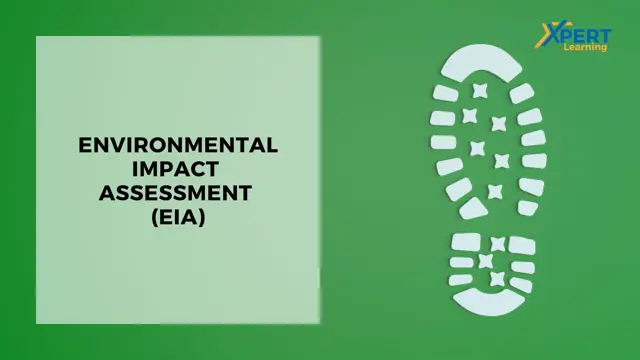
Environmental Impact Assessment (EIA) - Online Course
Learn Environmental Impact Assessment (EIA) and its role in Sustainable Development with This Online Course
Xpert Learning
Summary
- Reed Courses Certificate of Completion - Free
- Certification of Completion - £4
- Tutor is available to students
Add to basket or enquire
Overview
Understand the science and engineering behind Environmental Impact Assessment (EIA) and learn the skills to identify, assess, and rank impacts.
Environmental Impact Assessment isn't just about paperwork for getting a permit or license– it's a powerful tool for assessing actual impact on the environment and ensuring sustainable projects. EIA guides developers towards projects that minimize environmental footprint, promote responsible resource use, and contribute to a healthier, more livable environment for all.
Unleash your potential to understand, assess, and mitigate the environmental impacts of development projects with our comprehensive Environmental Impact Assessment (EIA) online course. Dive deep into legal frameworks, methodologies, real-world case studies, and best practices in order to equip yourself with the knowledge and skills to navigate the EIA process from A to Z.
Curriculum
Course media
Description
Course Curriculum of this comprehensive course:
- Module 1 Environmental Impact Assessment
- Module 2 Legal and Regulatory Frameworks
- Module 3 EIA Process and Methodologies
- Module 4 Social and Cultural Considerations
- Module 5 Biophysical Impact Assessment
- Module 6 Cumulative and Indirect Effects
- Module 7 Mitigation and Enhancement Measures
- Module 8 Public Participation and Stakeholder Engagement
- Module 9 Environmental Management Plans (EMPs) and Monitoring
- Module 10 EIA Review, Auditing, and Decision-making
- Module 11 Best Practices and Case Studies
Module 12 Emerging Trends in EIA
Learning Outcomes/Course Objectives:
- Grasp the fundamentals of EIA: Understand the principles, purpose, and importance of EIA in ensuring sustainable development.
- Master the legal and regulatory landscape: Navigate relevant environmental laws, regulations, and policies governing the EIA process.
- Navigate the EIA process with expertise: Implement best practices in every stage of the EIA process, from screening and scoping to impact assessment, mitigation measures, and public engagement.
- Integrate social and cultural considerations: Assess the social and cultural implications of projects and ensure equitable distribution of benefits and burdens.
- Evaluate biophysical impacts: Analyze the potential impacts of projects on air, water, soil, flora, fauna, and ecosystem services.
- Manage cumulative and indirect effects: Identify and address the broader implications of projects, including cumulative and indirect effects on the environment.
- Develop effective mitigation and enhancement measures: Formulate practical strategies to minimize negative impacts and maximize positive environmental outcomes.
- Engage stakeholders effectively: Foster meaningful public participation and incorporate stakeholder feedback throughout the EIA process.
- Craft comprehensive Environmental Management Plans (EMPs): Design robust EMPs to monitor environmental impacts, implement mitigation measures, and ensure compliance.
- Navigate review, auditing, and decision-making: Understand the review and auditing processes and prepare for informed decision-making on project proposals.
- Stay ahead of the curve: Explore emerging trends and innovations in EIA, ensuring your skillset remains relevant in an evolving field.
Who is this course for?
- Environmental professionals: Consultants, scientists, engineers, and policymakers involved in conducting or reviewing EIAs.
- Project developers and proponents: Gain insights into the EIA process and its implications for project planning and approvals.
- NGOs and community organizations: Equip yourselves with the knowledge and tools to advocate for sustainable development and participate effectively in the EIA process.
- Students and individuals passionate about sustainability: Build a strong foundation in EIA and contribute to positive environmental change.
Requirements
- Curiosity and interest in environmental issues
- Basic understanding of scientific concepts
Career path
EIA online course opens doors to a variety of rewarding career paths in EIA and sustainable development.
- EIA Consultant
- Social Impact Consultant
- Ecological Consultant
- Sustainability Officer
- Project Manager
- Environmental Risk Manager
- Environmental Regulator
- Policy Analyst
- Public Engagement Specialist
- Environmental Advocate
- EIA Researcher
- Sustainability Educator
Questions and answers
Currently there are no Q&As for this course. Be the first to ask a question.
Certificates
Reed Courses Certificate of Completion
Digital certificate - Included
Will be downloadable when all lectures have been completed.
Certification of Completion
Digital certificate - £4
Reviews
Currently there are no reviews for this course. Be the first to leave a review.
Legal information
This course is advertised on reed.co.uk by the Course Provider, whose terms and conditions apply. Purchases are made directly from the Course Provider, and as such, content and materials are supplied by the Course Provider directly. Reed is acting as agent and not reseller in relation to this course. Reed's only responsibility is to facilitate your payment for the course. It is your responsibility to review and agree to the Course Provider's terms and conditions and satisfy yourself as to the suitability of the course you intend to purchase. Reed will not have any responsibility for the content of the course and/or associated materials.


